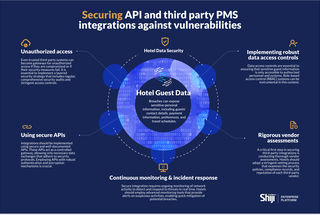Tackling API and third-party PMS integrations vulnerabilities

In the hotel industry but especially the luxury segment, the protection of guest data is crucial, yet the security of APIs and third-party Property Management Systems integrations is often alarmingly weak. API security is particularly neglected, with many interfaces poorly protected, exposing personal guest information to potential cyber-attacks.
This critical oversight addresses the core issue of what luxury hotels promise—unwavering privacy and exceptional service. In an era where digital operations are integral to even the simplest guest interactions, the importance of robust API security cannot be overstated. As leaders in this industry, we must commit to enforcing all of our current security protocols, transforming our APIs from potential liabilities into secure, fortified assets. This shift is not merely about safeguarding data; it's a fundamental aspect of maintaining the trust and loyalty of our guests and upholding the reputation that luxury hotels hold.
Third-party integrations often involve complex data flows between multiple systems, each potentially having different security protocols. This inconsistency can lead to gaps in the security landscape, offering cybercriminals various entry points to exploit. One primary vulnerability is the increased risk of data breaches. As data moves between the hotel’s PMS and third-party services, it passes through networks that might not be equally secured, leading to potential interceptions by hackers. Such breaches can expose sensitive personal information, including guests' contact details, payment information, preferences, and travel schedules. For luxury hotels, where guests often include high-profile personalities, the repercussions of such breaches extend beyond financial loss to potentially severe reputational damage.
Unauthorized access is another critical vulnerability. Third-party applications may require extensive access to the hotel’s PMS to function effectively, increasing the risk of unauthorized access through compromised third-party systems. However, even trusted third-party systems can become gateways for unauthorized access if they are compromised or if their security measures fail. It is essential to implement a layered security strategy that includes regular, comprehensive security audits and stringent access controls. Hotels should ensure that all third-party vendors undergo rigorous security screenings and continuous monitoring to safeguard against potential vulnerabilities. Additionally, establishing a protocol for immediate response to any signs of unauthorized access will help protect sensitive guest information. This combination of preventative measures and rapid response planning is critical to maintaining the high standards of privacy and security expected by guests.
Many luxury hotels adopt these third-party integrations not out of necessity but as a choice to enhance guest personalization and niche services. This selective integration approach must be carefully managed to ensure that each added service complies with the stringent security standards demanded by luxury clientele. Ensuring that all parties adhere to these standards is vital in maintaining not only the security but also the brand’s integrity and the trust of its guests.
Thorough Vendor Assessments:
A critical first step in securing third-party integrations is conducting detailed vendor assessments. Hotels should adopt a stringent vetting process that examines the security policies, compliance records, and reputation of each third-party vendor. This includes verifying adherence to international cybersecurity standards, such as ISO/IEC 27001, and industry-specific regulations like PCI DSS if handling payment information. Vendors should also be evaluated on their incident response capabilities and the security training provided to their employees. A continuous review process should be established to monitor vendors over time, ensuring they consistently meet security requirements.
Using Secure APIs:
Integrations should be implemented using secure and well-documented APIs. These APIs act as a controlled gateway, allowing only necessary data exchanges that adhere to security protocols. Employing APIs with robust authentication and encryption mechanisms is crucial. OAuth, for instance, is widely recognized for securing access to HTTP services, which can be utilized to ensure that data transmissions between the hotel’s PMS and third-party services are encrypted and secure from interception. Regular security audits of the APIs should be conducted to detect and rectify any vulnerabilities that may arise.
Implementing Robust Data Access Controls:
Data access controls are essential to ensuring that sensitive guest information is only accessible to authorized personnel and systems. Role-based access control (RBAC) systems can be instrumental in this context. RBAC ensures that only employees with necessary clearance can access specific tiers of data, effectively minimizing the risk of internal data breaches. Additionally, implementing least privilege access for third-party services—limiting their access to what is strictly necessary for the service function—can significantly reduce the risk of unauthorized data exposure.
Continuous Monitoring and Incident Response:
Secure integration requires ongoing monitoring of network activity to detect and respond to threats in real time. Luxury hotels should employ advanced monitoring to receive alerts on suspicious activities, enabling quick mitigation of potential breaches. Having a well-defined incident response plan specifically tailored to handle the complexities of third-party integrations is also vital. This plan should outline steps for containing breaches, notifying affected parties, and swiftly restoring services to mitigate any impact on guest experience and hotel operations.
By systematically implementing these strategies, luxury hotels can safeguard their operations against the increased cybersecurity risks brought by third-party integrations, thus preserving guest trust and upholding their reputation for exclusive and secure service.